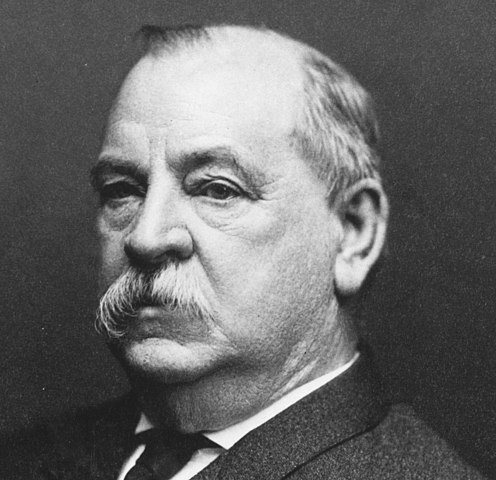Grover Cleveland, the United States’ 22nd and 24th President. He was also known as an honest Democrat and is the first President to serve two non-consecutive terms of office in American history. He was named Stephen Grover Cleveland after the Presbyterian Church of Caldwell’s first pastor. As he grew up, he refrained from using Stephen. He was born on March 18, 1837, in Caldwell, New Jersey to Ann Neal, a daughter of a bookseller in Baltimore, and Richard Falley Cleveland, a traveling Presbyterian minister.
Their family moved to Fayetteville, New York in 1841. Eventually, as part of his father’s pastorate duties, the Cleveland family moved to Oneida County, New York. Unfortunately, Grover Cleveland’s father died in 1853 when they moved to Holland Patent, which forced him to quit school and support his mother and siblings.
He was soon recruited by his brother at the New York Institute for the Blind in New York City, as an assistant teacher. Grover Cleveland relocated to Buffalo a year later, where he served as a cleric under his uncle, Lewis Allen. Lewis Allen presented prominent individuals from him. He was subsequently recruited to the law firm of Rogers, Bowen and Rogers, where, years later, he was admitted to the bar after being promoted to Chief Clerk in 1859. Grover Cleveland continued his service in the firm until 1862 when he decided to leave the firm to start his own.
Grover Cleveland was designated as the assistant district attorney of Erie County in 1863. He was notorious as a focused and dedicated lawyer. During Civil War, In 1866, he defended the participants in the Fenian raid, where Irish American immigrants attempted to gain the independence from the British by invading Canada. He worked for them on a pro bono basis, where it is free of charge.
One of the highlights of Grover Cleveland’s career was when he successfully defended the libel suit against the editor of Buffalo’s commercial advertiser in 1866. By that time, he lives in a life of simplicity because he still lived in a boarding house since he was using his income to support his mother and sisters back then.
When Grover Cleveland became involved in politics, he became associated with the Democratic Party. In 1881, he ran successfully for Mayor of Buffalo and took office on January 2, 1882. He worked hard in that role to combat government corruption in order to protect public funds.
The New York Democratic Party officials mentioned Grover Cleveland as a potential candidate for governor because of his success as mayor. He won the elections easily and, in January 1883, was made the Governor of New York. He opposed excessive government expenditures and, in his first two months in office, vetoed eight bills sent by the legislature.
The Democrats were looking for a presidential candidate in 1884 that would contrast sharply with James G. Blaine, the Republican nominee. For his dishonesty and absence of morals, Blaine was legendary. Grover Cleveland came across as the perfect Democratic candidate with his untarnished image as an upright individual with clear moral principles. The presidential election was narrowly won by Grover Cleveland.
On March 4, 1885, he took office as the 22nd President of the United States. When he first became president, Grover Cleveland was a bachelor and became the first president to be married in the White House. He married Frances Folsom in 1886, the daughter of Oscar Folsom, his deceased friend. At the time of their marriage, Frances was 27 years his junior and just 21 years old. The couple were blessed with five children by this marriage.
In is first term as the president, he carried out many measures to curb corruption during his term and passed several reform laws, including the Interstate Commerce Act of 1887, which established the Interstate Commerce Commission, and the Dawes General Allotment Act of 1887, which redistributed Indian reservation land to individual members of the tribe.
In 1888, he voted for re-election against Benjamin Harrison, the Republican nominee. This time, although the Democrats’ campaign was badly handled, the Republicans campaigned vigorously. Benjamin Harrison finally prevailed and, in 1889, Grover Cleveland stood down as president. As he stepped down the White House, Grover Cleveland resumed his career as a lawyer and took up a job with a prominent law firm. It became apparent in the early 1890s that the Republican government of Harrison was becoming increasingly unpopular and Cleveland decided to challenge the next presidential election.
During the 1892 presidential election against the incumbent Harrison, he became the Democratic nominee again. As Harrison’s wife, who was very sick during the campaigning, died just days before the election, the election proved to be a somber affair. Cleveland prevailed by wide margins in the election.
On March 4, 1893, Grover Cleveland began his second presidential term. His second term, marked by acute economic downturn, civil strife, and the notorious Pullman Strike, was more complicated than the first one. During this term, he also suffered from bouts of ill health. On March 4, 1897, he resigned as president.
Grover Cleveland is well known for his reforms as President. The passage of the Interstate Commerce Act of 1887, which established the Interstate Commerce Commission (ICC) to ensure fair prices to eradicate rate discrimination, and to regulate other aspects of common carriers, was one of the significant steps introduced by the government during Cleveland’s tenure.
On June 24th, 1908, at the age of 71, he died of a heart attack. Years earlier, he was diagnosed with a successfully treated cancerous tumor in his jaw.
US Presidents | ||

